Miniature Pinschers, or Min Pins as they are often called, are small dogs with big personalities. Can Miniature Pinschers Swim? They are known for their high energy and playful nature, but many people wonder if they can swim. This is a valid concern for owners who live near bodies of water or who enjoy taking their dogs on boating trips.
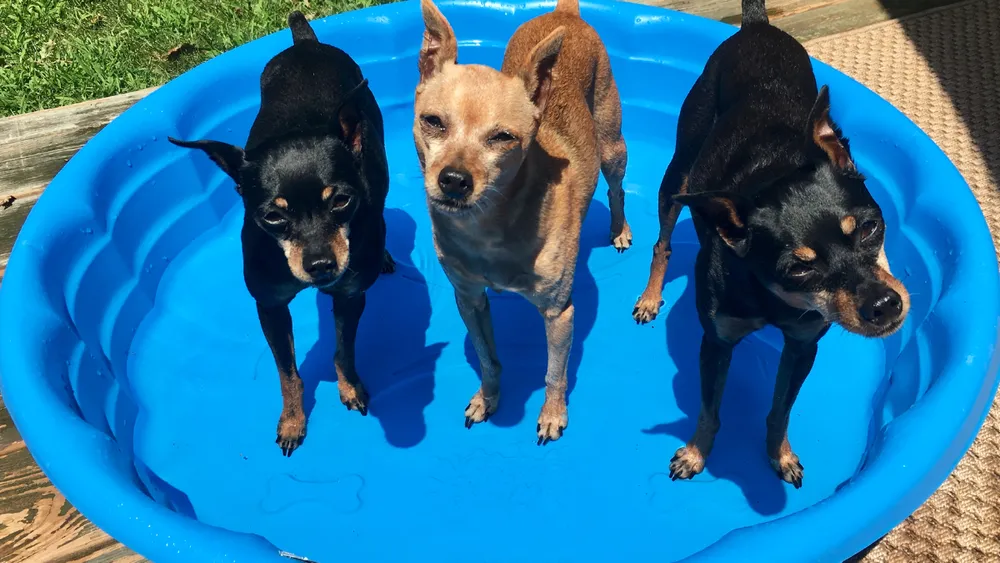
Despite their small size, Min Pins are quite strong and athletic. They are known for their ability to jump high and run fast, but swimming is not necessarily their forte. While some Min Pins may enjoy swimming and be quite good at it, others may not be as comfortable in the water. It ultimately depends on the individual dog and their preferences.
Min Pin owners need to introduce their dogs to water gradually and always supervise them when they are swimming. Additionally, it's a good idea to invest in a life jacket for your dog, especially if you plan on taking them on a boat or to the beach. While not all Min Pins are natural swimmers, with proper training and precautions, they can safely enjoy the water just like any other dog.
Breed Overview
History and Origin
The Miniature Pinscher, also known as Min Pins, is a small breed of dog that belongs to the Toy Group. Despite its name, the breed is not related to the Doberman Pinscher. The Miniature Pinscher originated in Germany, where it was bred to hunt rats in homes and stables. The breed is believed to have been created by crossing the German Pinscher, Dachshund, and Italian Greyhound.
Physical Characteristics
Miniature Pinschers are small dogs that typically weigh between 8 and 10 pounds. They have high-set ears, oval eyes, and a short, smooth coat that can be red, stag red, or black with rust markings. The breed's tail is usually docked, and its eyes are dark.

Temperament and Personality
Miniature Pinschers are active and energetic dogs that are known for their fearless nature. They are intelligent, curious, and vigilant, making them excellent watchdogs. Miniature Pinschers are also playful and adaptable, making them great family pets. However, they can be prone to barking and may not get along well with other pets.
Health and Lifespan
Miniature Pinschers have a lifespan of around 12 to 14 years and are generally healthy dogs. However, like all breeds, they can be prone to certain health issues, including progressive retinal atrophy (PRA), Legg-Calve-Perthes disease, patellar luxation, and cataracts. It is important to provide proper healthcare and regular check-ups to ensure the dog's overall health. Pet insurance can also help cover unexpected medical expenses.
Caring for a Miniature Pinscher
Miniature Pinschers are small, energetic dogs that make great companions for those who are willing to meet their needs. Here are some tips for caring for your Miniature Pinscher.
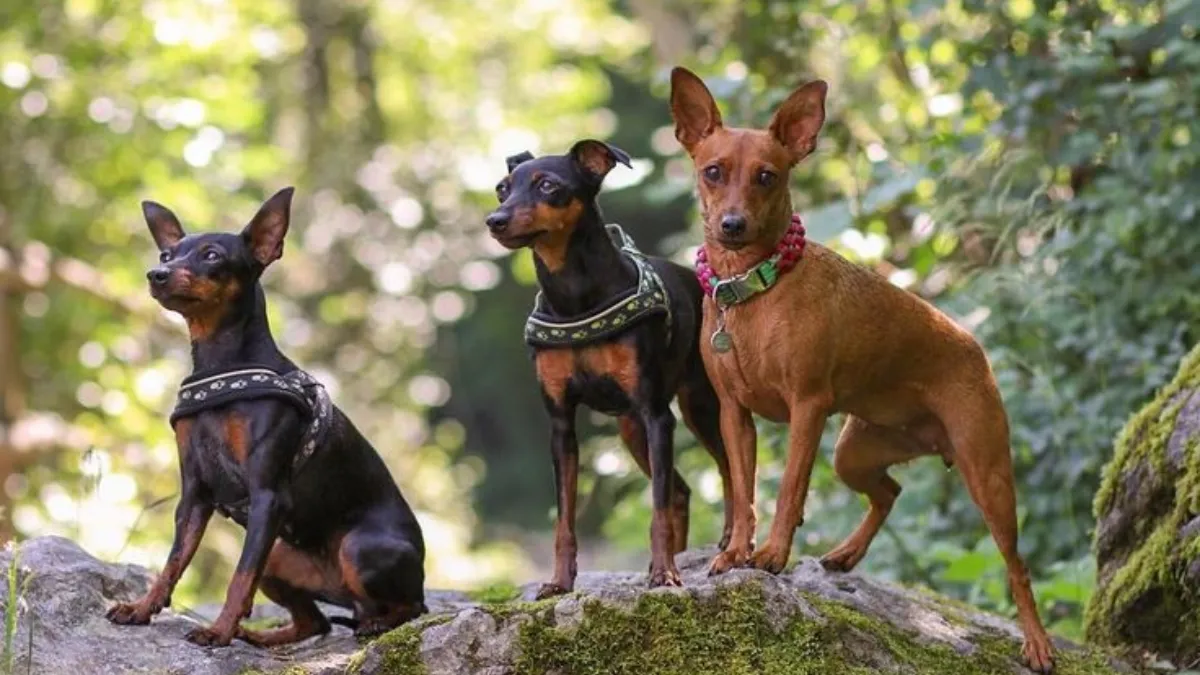
Feeding and Nutrition
Miniature Pinschers have high energy levels and require a balanced diet to maintain their health. It is recommended to feed them high-quality dog food that is appropriate for their age, size, and activity level. It is important to provide them with clean water at all times and to avoid feeding them table scraps or human food.
Exercise Requirements
Miniature Pinschers are active and athletic dogs that require daily exercise to maintain their physical and mental health. They enjoy running, playing, and going for walks. It is important to provide them with enough exercise to prevent them from becoming bored or destructive.
Grooming Needs
Miniature Pinschers have short, smooth coats that require minimal grooming. They shed moderately and should be brushed regularly to remove loose hair. Their nails should be trimmed regularly, and they should be checked for ticks, fleas, and worms.
Training and Socialization
Miniature Pinschers are intelligent dogs with an independent mind. They require consistent and positive reinforcement training to become well-trained and obedient. They also benefit from socialization with other dogs and people to prevent them from becoming shy or aggressive.
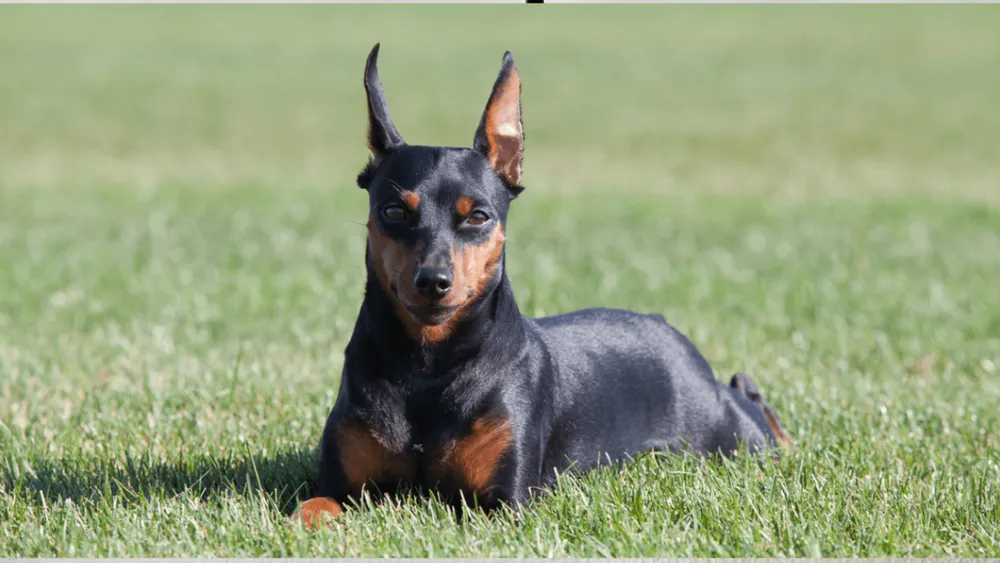
Healthcare and Vaccinations
Miniature Pinschers are generally healthy dogs, but they can be prone to certain health problems such as hip dysplasia and patellar luxation. It is important to take them to the veterinarian regularly for checkups and vaccinations to prevent them from getting sick.
In conclusion, caring for a Miniature Pinscher requires a commitment to meeting their needs for exercise, mental stimulation, grooming, training, and healthcare. With proper care and attention, they can be loyal and loving companions for many years.
Miniature Pinscher as a Pet
Miniature Pinschers, or Min Pins, are small dogs that are known for their energetic and playful personalities. They are a popular choice for pet owners who are looking for a small dog that is easy to care for and can adapt to different living spaces.
Suitability for Families
While Min Pins can make great family pets, they may not be the best choice for families with young children. They are a small and delicate breed, and may not be able to handle rough play or accidental injuries from young children. However, they can be great companions for older children who can handle them with care.
Adaptability to Living Spaces
Min Pins are a great choice for apartment living, as they are small and do not require a lot of space to be happy. They are also adaptable to different living spaces and can be just as happy in a small apartment as they are in a larger home with a yard.
Interaction with Other Pets
Min Pins can be social with other pets, but it is important to introduce them slowly and carefully. They have a strong prey drive and may see smaller animals as prey. They may also be aggressive towards other dogs, especially if they are not properly socialized.
Considerations for First-Time Owners
Min Pins can be a great choice for first-time dog owners, as they are relatively easy to care for and can adapt to different living spaces. However, it is important to remember that they are an active breed and require daily exercise and mental stimulation. They can also be prone to certain health issues, such as hip dysplasia and patellar luxation, so it is important to find a reputable breeder or rescue group when looking to adopt a Min Pin.
Overall, Min Pins can make great pets for the right owner. They are a small and adaptable breed that can provide companionship and entertainment to their owners. However, it is important to remember that they require daily exercise and mental stimulation, and may not be the best choice for families with young children or other pets.
Common Questions About Miniature Pinschers

Can Miniature Pinschers Swim?
Miniature Pinschers, or "Min Pins" as they are commonly known, are energetic and active toy dogs that require plenty of exercise and mental stimulation. While they may enjoy playing in the water, they are not natural swimmers and may struggle to stay afloat for long periods. It is important to supervise them closely around water and provide them with a flotation device if necessary.
Are Miniature Pinschers Good with Children?
Miniature Pinschers are generally good with children, but they may not be the best choice for families with young children. They are small and delicate, and may not tolerate rough play. It is important to teach children how to interact with them gently and respectfully.
How to Train a Miniature Pinscher?
Training a Miniature Pinscher requires patience, consistency, and positive reinforcement. They respond well to food rewards and praise and may become stubborn if treated harshly. It is important to socialize them from a young age and provide them with mental stimulation to prevent boredom and destructive behavior.
Do Miniature Pinschers Require a Lot of Attention?
Miniature Pinschers are social dogs that thrive on companionship and may become anxious or destructive if left alone for long periods. They require daily exercise and mental stimulation and may benefit from having another dog or a human companion to keep them company.
What Are the Risks of Obesity in Miniature Pinschers?
Miniature Pinschers are prone to obesity and may suffer from health issues related to being overweight, such as joint problems and diabetes. It is important to feed them a balanced diet and provide them with regular exercise to maintain a healthy weight.
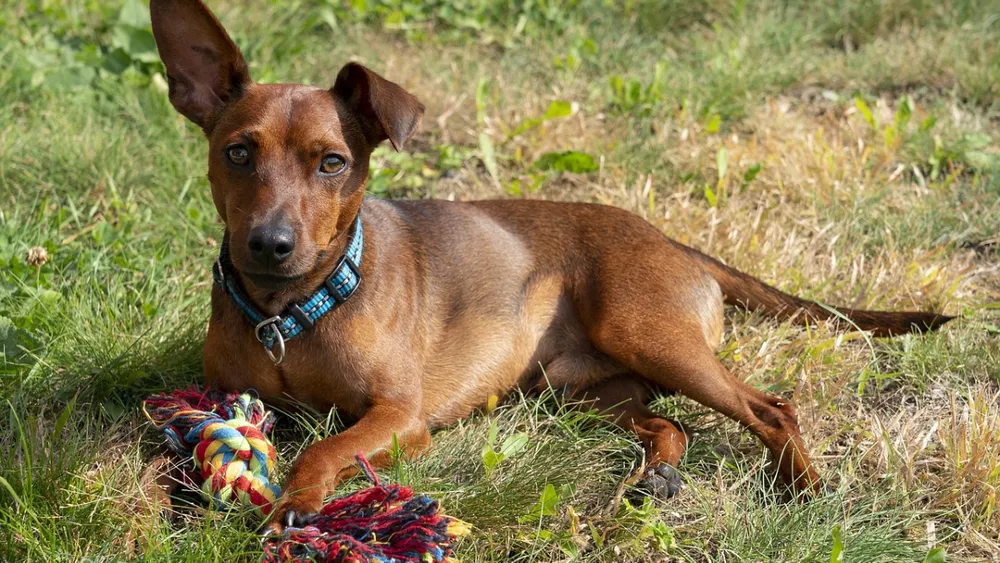
In summary, Miniature Pinschers are energetic and social dogs that require plenty of exercise, mental stimulation, and companionship. While they may enjoy playing in the water, they are not natural swimmers and should be supervised closely around the water. Training should be done with positive reinforcement, and it is important to socialize them from a young age. They may become anxious or destructive if left alone for long periods and are prone to obesity if not given a balanced diet and regular exercise.
Getting a Miniature Pinscher
If you are considering getting a Miniature Pinscher, there are several things to keep in mind. This section will cover some of the important factors to consider when choosing a breeder, adoption, and rescue options, and whether to get a puppy or an adult.
Choosing a Breeder
When looking for a Miniature Pinscher breeder, it is important to do your research and find a reputable breeder. Look for breeders who are registered with a reputable kennel club and who prioritize the health and well-being of their dogs. A good breeder will be happy to answer any questions you may have about the breed and their breeding practices.
Adoption and Rescue Options
Adopting a Miniature Pinscher from a rescue group or shelter is a great option for those who want to give a dog a second chance at a loving home. Many rescue groups specialize in Miniature Pinschers and other small breeds. It is important to keep in mind that rescue dogs may have had a difficult past and may require extra patience and socialization.
Puppy or Adult? Pros and Cons
Deciding whether to get a puppy or an adult Miniature Pinscher depends on your lifestyle and preferences. Puppies require more time and attention for training and socialization but can be a great option for those who want to raise a dog from a young age. Adult dogs may already be trained and socialized but may require more patience and understanding as they adjust to their new home.
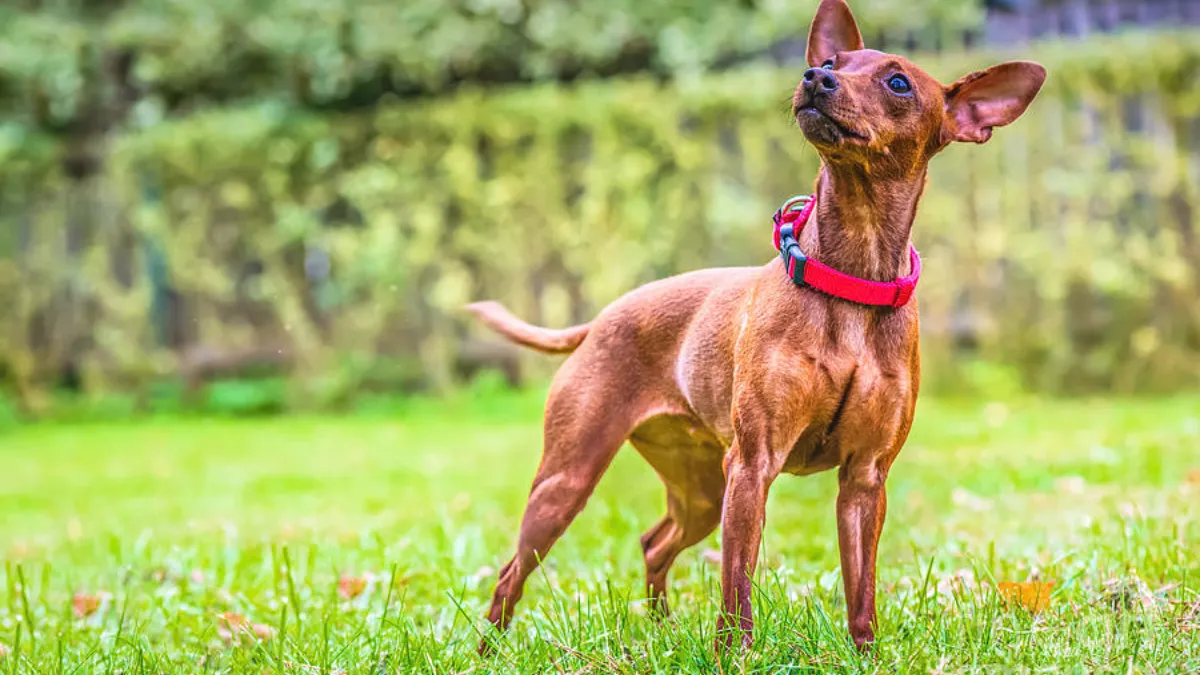
Regardless of where you get your Miniature Pinscher, it is important to prioritize socialization and training to ensure a happy and well-behaved companion. Keep in mind that Miniature Pinschers are known for their energetic and playful personalities, and require plenty of exercise and companionship to thrive. It is also important to be aware of potential health issues such as patellar luxation and progressive retinal atrophy, and to work with a veterinarian to keep your dog healthy and happy.
Conclusion:
In conclusion, miniature pinschers are not natural swimmers due to their small size and short legs. While some may enjoy water activities, it is important to always supervise them and provide appropriate safety measures such as life jackets. Can Miniature Pinschers Swim?
Owners must do their research and understand their pet's limitations and preferences before exposing them to water. Some min pins may have anxiety or discomfort around water, so it is important to provide companionship and reassurance during water activities.
Overall, while miniature pinschers may not be the best swimmers, they still make great companions and can enjoy a variety of activities with their owners. It is important to prioritize their safety and comfort at all times.